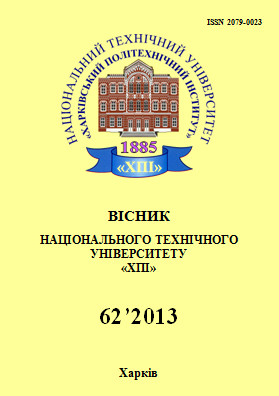Multilevel programming model for constructing schedules processing requirements of different types of sets (in the formation of groups of parties)
DOI:
https://doi.org/10.20998/%25xAbstract
In the paper, the multi-level programming model for efficient composition of the groups of parties, scheduling of operations with the processing of claims included in the kits of different types, with restrictions on the duration of the intervals of the system.References
Петросян Л. А. Теория игр. / Л. А. Петросян, Н. А. Зенкевич, Е. А. Семина. – М. : Высшая школа, 1999. – 300 с.
Гермейер Ю. Б. Игры с непротивоположными интересами. / Ю. Б. Гермейер. – М. : Наука, 1976. – 327 с.
Ковалев М. М. Модели и ме¬тоды календарного планирования. Курс лекций. / М. М. Ковалев. – Минск : Изд-во БГУ, 2004. – 63 с.
Кротов К. В. Градиентный метод составления расписаний в многостадийной системе с одинаковым порядком обслуживания требований и одинаковым временем поступления. / К. В. Кротов // Сборник научных трудов «Оптимизация производственных процессов». вып. 12. – Севастополь : Изд-во СевНТУ, 2010. – С.154–160.
Downloads
Published
How to Cite
Issue
Section
License
Copyright (c) 2015 Вісник Національного технічного університету «ХПІ». Серія: Системний аналiз, управління та iнформацiйнi технологiїAuthors who publish with this journal agree to the following terms:
- Authors retain copyright and grant the journal right of first publication with the work simultaneously licensed under a Creative Commons Attribution License that allows others to share the work with an acknowledgement of the work's authorship and initial publication in this journal.
- Authors are able to enter into separate, additional contractual arrangements for the non-exclusive distribution of the journal's published version of the work (e.g., post it to an institutional repository or publish it in a book), with an acknowledgement of its initial publication in this journal.
- Authors are permitted and encouraged to post their work online (e.g., in institutional repositories or on their website) prior to and during the submission process, as it can lead to productive exchanges, as well as earlier and greater citation of published work (See The Effect of Open Access).

